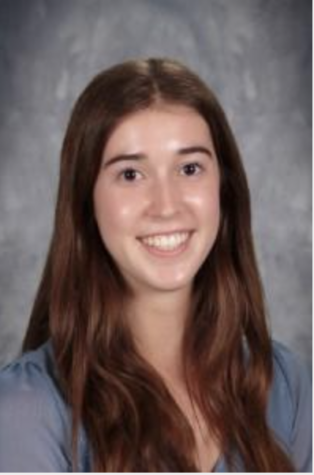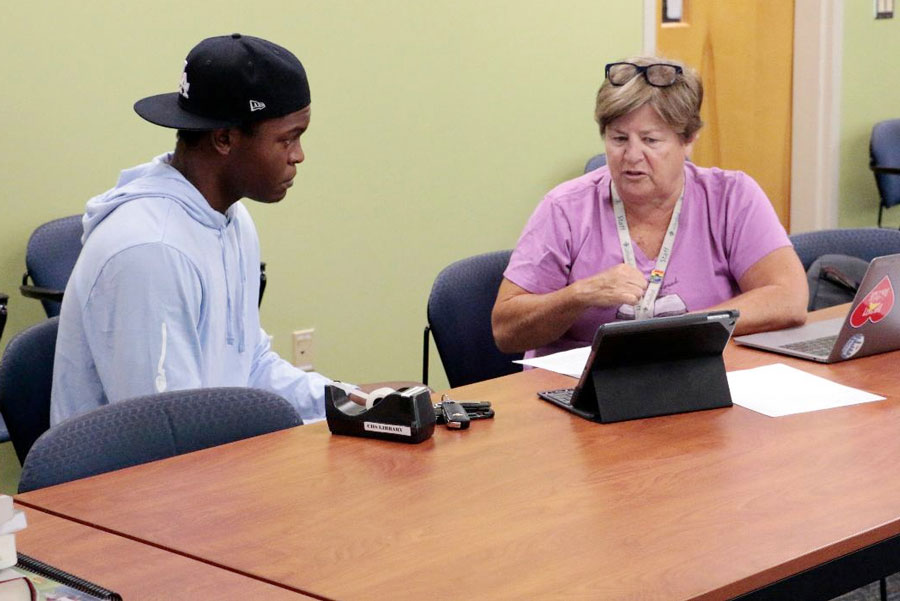Teachers use variety of tools for AP exam prep
Some classes met during J-Term to help students get ready
During the college admissions bootcamp in August, English teacher Ms. Laurie O’Brien reviews college application material with senior Jerron Conway. O’Brien is one of several AP teachers who are preparing their students now for the AP exams in May.
While they may be a few months off, it’s not too early for Advanced Placement students to start preparing for their exams in May.
And that preparation comes after students lost instructional time in their AP classes during the two weeks of J-Term, but teachers say they have a plan in place to get their students caught up.
AP Psychology teacher Mr. John O’Hara ‘02 said, “I would say we are probably a little behind to J-Term which won’t be too difficult to recover from.”
On the other hand, AP Biology teacher Dr. Aarti Brooks said, “I would say I am a little bit behind and I think it’s partly because of decreased class time.”
So the question remains, are these AP classes prepared and if not, what can they do to prepare?
In the past, there has always been a rush when it comes to AP classes. Brooks said, “It’s a college-level biology class where you survey many topics.” With teachers acknowledging the difference in difficulty along with the effort that is required of their AP students.
During J-Term, teachers had the option to meet with their students during office hours before school. But not all teachers did so. AP Literature teacher Matt Panzer stated, “I also knew that other subjects like math, history and science needed the time more, so I was able to give students that time that they hopefully used for any other classes.”
O’Hara said, “The majority of my students had two or three classes they had to meet, so I was not going to put more work on their plate during that time.”
A large part of a college-level course is having college-level coursework. Brooks said, “I think the only way to catch up at this point is to have the kids do something on their own.” A common resource for students studying for the AP tests is AP Classroom, a College Board website on which teachers can post assignments and students can access videos.
In addition to using AP Classroom to prepare for the tests, another key resource utilized by teachers is giving AP practice tests. O’Hara said, “We take a multitude of practice exams, multiple-choice and (free response questions). We also do large study groups per class and each group is responsible for creating a study guide for each unit. All of those study guides get shared, so it’s a great study tool.”
Brooks said, “I didn’t do classes during J- term. I gave my kids a practice AP exam during finals week and said to have that done by Jan. 18 rather than meeting with kids, because not everyone would be able to meet. I just had them do work on their own.”
After the AP exams conclude, teachers still have class time before the school year ends. Considering most AP classes do not take the second-semester final exams, that leaves room to explore. Projects, movies and discussions dominate the agenda, and especially for seniors, the work required dwindles as well.
Panzer said, “After the test, we have a couple of final wrap up days, but most of the time my class is not full due to students testing for other AP classes, so when I meet I usually have only 40% of kids in the class. But we want to make sure to wrap up the best we can.”
For many, the idea of advanced classes can seem daunting, but teachers advocate for at least giving it a shot. Panzer said, “Cathedral offers a ton of variety, and AP has been a tried and true pathway to success and college credit, so I’d recommend taking at least one AP class in a method you’re interested in. But AP is a really good benchmark for your collegiate readiness.”

Maddie is an editor for the school newspaper. She is a senior who is involved in track and field, swimming, and speech and debate. She has two dogs at...







